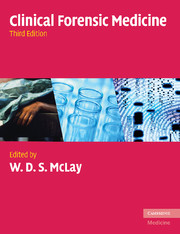Book contents
- Frontmatter
- Contents
- List of contributors
- Preface
- 1 Legal systems: a world view
- 2 Scottish legal system
- 3 The Police in the United Kingdom
- 4 The practitioner's obligations
- 5 The doctor in court
- 6 Custody medicine: physical conditions
- 7 Custody medicine: mental illness and psychological conditions
- 8 Substance misuse
- 9 Alcohol, drugs and driving
- 10 Injury
- 11 Child abuse: physical
- 12 Child abuse: sexual
- 13 Adult sexual offences
- 14 Management of at-risk exposures and infection control in custody
- 15 Scenes of crime
- 16 Forensic science
- 17 Forensic dentistry
- 18 Investigation of death
- 19 Dealing with a major disaster
- 20 Occupational health of police officers
- Index
- References
1 - Legal systems: a world view
Published online by Cambridge University Press: 12 August 2009
- Frontmatter
- Contents
- List of contributors
- Preface
- 1 Legal systems: a world view
- 2 Scottish legal system
- 3 The Police in the United Kingdom
- 4 The practitioner's obligations
- 5 The doctor in court
- 6 Custody medicine: physical conditions
- 7 Custody medicine: mental illness and psychological conditions
- 8 Substance misuse
- 9 Alcohol, drugs and driving
- 10 Injury
- 11 Child abuse: physical
- 12 Child abuse: sexual
- 13 Adult sexual offences
- 14 Management of at-risk exposures and infection control in custody
- 15 Scenes of crime
- 16 Forensic science
- 17 Forensic dentistry
- 18 Investigation of death
- 19 Dealing with a major disaster
- 20 Occupational health of police officers
- Index
- References
Summary
The English legal system is based on the common law. Consistency and predictability are assured by prior decisions of the courts on similar matters establishing judicial precedent. The continuing role of the courts is to apply and develop the common law. Statute law is created by Parliament and takes precedence over common law, Parliament being the supreme legal authority of the United Kingdom. This supremacy has been affected by the UK's membership of the European Union (EU), with European Law taking precedence over British Acts of Parliament (although it is still thought possible by many that Parliament could reassert its supremacy if it should so choose).
The alternative legal tradition in most of Europe is derived originally from the legal system of Ancient Rome, also known as Civil Law (the latter not to be confused with English ‘civil law’ which refers to non-criminal legal matters – see below). Over the centuries the code developed as a body of international law, the ius commune and was later codified in many countries as their own national expression of law. In contrast to common law precedent, consistency is achieved by judicial application and interpretation of the code, rather than of prior case law decisions.
The United Kingdom exported the English legal system to its colonies, including the United States, and the countries of the Commonwealth. Most retained it after independence. By similar colonial expansion many countries of Europe established Roman law as the predominant legal system.
- Type
- Chapter
- Information
- Clinical Forensic Medicine , pp. 1 - 18Publisher: Cambridge University PressPrint publication year: 2009



